Butkus
The Legendary Career of Dick Butkus
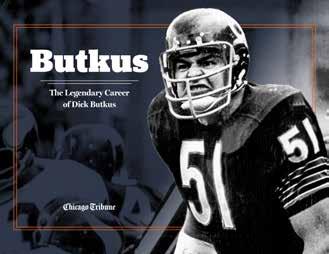
ON THE COVER: Dick Butkus is arguably one of the best linebackers ever to play, possessing strength, agility and quickness to cover running backs and tight ends on the same play. He played for the Bears from 1965 to 1973, making seven Pro Bowl teams, collecting 22 interceptions and recovering 27 fumbles. He was elected to the Hall of Fame in 1979, his first year of eligibility.
STEVE LASKER / CHICAGO TRIBUNE
RIGHT: Dick Butkus acknowledges fans before announcing the second-round draft pick for the Chicago Bears during the 2015 NFL Draft at the Auditorium Theatre at Roosevelt University, May 1, 2015, in Chicago. JOHN J. KIM / CHICAGO TRIBUNE
Photographers
Chicago Tribune: Milbert Orlando Brown, Brian
Cassella, Ed Feeney, Bob Fila, Dave Fornell, Ray
Gora, John J. Kim, Steve Lasker, Phil Mascione, Eileen T. Meslar, Chris Sweda, Michael Tercha, Chris Walker, Charles Rex Arbogast, Charles
Bennett, Mark J. Terrill
Associated Press: Charles Rex Arbogast, Charles
Bennett, Mark J. Terrill
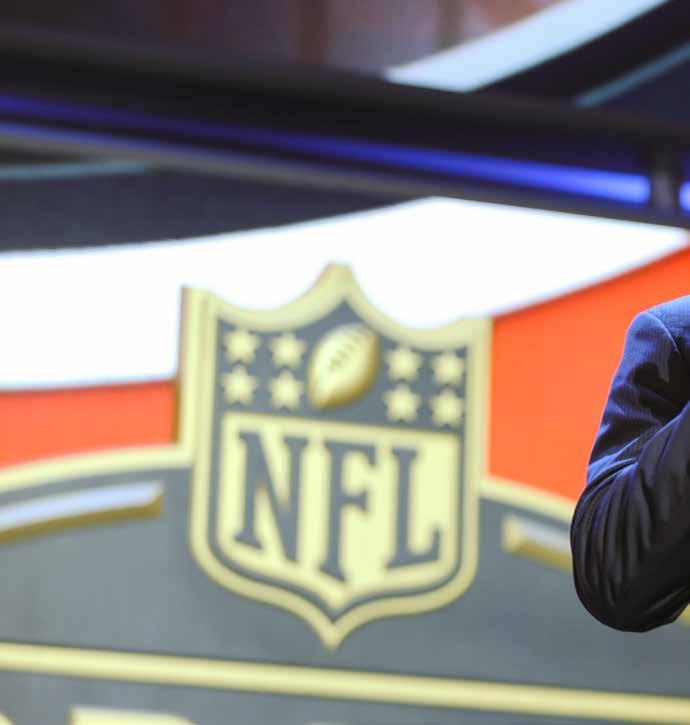
2 • BUTKUS
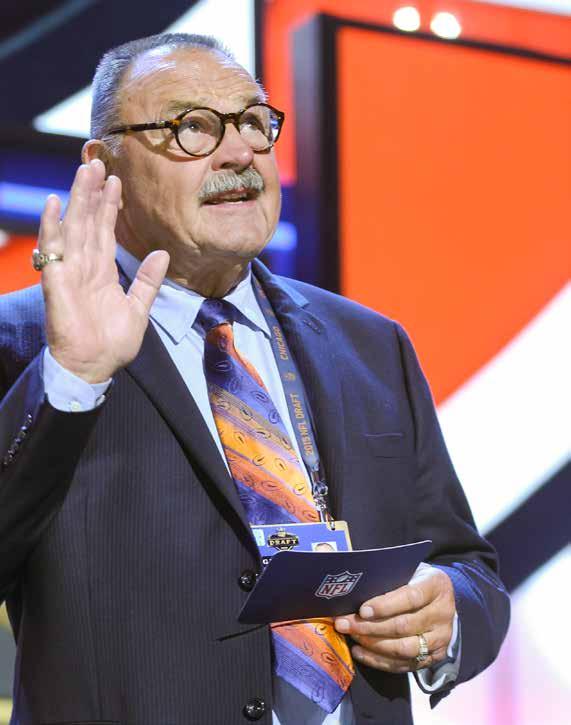
CONTENTS • 3 Copyright © 2024 by the Chicago Tribune All Rights Reserved • ISBN: 978-1-63846-086-2 No part of this book may be reproduced, stored in a retrieval system or transmitted in any form or by any means, electronic, mechanical, photocopying, recording or otherwise, without prior written permission of the copyright owner or the publisher. Published by Pediment Publishing, a division of The Pediment Group, Inc. www.pediment.com • Printed in Canada. This book is an unofficial account of the career of Dick Butkus and is not endorsed by the NFL or the Chicago Bears. Contents Foreword 4 Introduction ............................................................................6 The Early Days .............................................................. 10 The NFL Years 25 Retirement ........................................................................... 113 In Memoriam ................................................................. 135 Epilogue 144
FOREWORD
Chicago’s homegrown football legend
JEFF BANOWETZ
It would be next to impossible to track most people’s lives through the pages of a newspaper. But how many of us make news from high school through our eighth decade of life?
Dick Butkus was the rare exception.
From the time he first stepped foot on the field at Chicago’s Vocational High School, he demanded attention. During Butkus’ junior year, John Leusch wrote in the Chicago Tribune that he was “Vocational’s most dependable ball carrier, best blocker, and best kicker…(he) is a good passer and pass receiver, and he has been credited with making almost 70 per cent of the tackles in each of the Cavaliers’ eight victories in an unbeaten season thus far. Dick kicks off, punts, and kicks extra points.”
It was the start of a football career that would help define the Bears franchise and the city it calls home. He was a favorite son whose blue-collar mentality, exceptional skill and unparalleled competitive nature are remembered generations later. This book, assembled from articles and photography first published in the Chicago Tribune, illustrates how Butkus developed into one of the city’s defining figures.
After high school, he attended the University of Illinois, where he played both sides of the ball, earning All-American honors at center and linebacker. He averaged more than 16 tackles a game while leading the Illini to the top of the Big Ten and a victory in the Rose Bowl in 1964.
In 1965, the Chicago Bears drafted him third overall, with a pick acquired via a trade with the Pittsburgh Steelers. With the next pick, the Bears selected another legend, Gale Sayers. Two Hall-of-Famers in two picks made it the most successful draft in Bears history.
As a pro, Butkus quickly became one of the top defenders in the league, defining the linebacker position for a generation. His violent style made him a household name. As Rams defensive end Deacon Jones recalled, “He was a well-conditioned animal, and every time he hit you, he tried to put you in the cemetery, not the hospital.”
This playing style took its toll on Butkus, who battled injuries throughout his career.
Surgery on his right knee in 1971 enabled him to continue playing, but he lasted only two more seasons. He retired at age 31 after nine years in the NFL. His time with
the Bears would be remembered more for his individual excellence than the team’s success (he played on only one team with a winning record). Yet, decades later, the familiar number 51 jersey remained a common sight at Soldier Field.
Of course, it helped that he remained in the public spotlight long after his playing career ended. He found success in Hollywood, first with commercials, starting with Miller Lite TV spots that were part of one of the most successful ad campaigns in history. He had roles in more than 50 movies and TV shows. He appeared in sitcoms and serial dramas throughout the ’80s and ’90s, and younger viewers would often see him pop up on shows as a teacher or coach. (At one Chicago-based Disney Channel show, the kids attended Dick Butkus High School.)
As he told the Tribune’s Fred Mitchell in 1998, after 27 years as a Screen Actors Guild member: “I never thought that would happen. People would have laughed. But that’s the way things turned out. I always thought I would be in football. Maybe (George) Halas did me a favor by not letting me become a coach. It has worked out all right.”
But he never left the football world. He found plenty of work as a commentator and was heavily involved with the Butkus Award, which is given annually to the top linebackers at the high school, college and NFL level. In 2000 he became the head coach of Chicago’s XFL franchise, a shortlived attempt that embraced the violence of the game that had made Butkus famous.
Reading about Butkus through contemporary sources, a few themes emerge. First and foremost is the admiration and respect for the man throughout his career. Never has an athlete felt more connected to the city. His role as a linebacker — who does the hard, necessary and dirty work on the football team — fit perfectly with his upbringing and the city’s image of itself.
We also realize how much the sport, journalism and the city have changed over the years. These stories provide a time capsule to an era that’s both familiar yet radically different from today. They also help us better understand the life of a homegrown Chicago legend who has never strayed far from our thoughts.
Chicago is still a Bears town, and we still love Dick Butkus.
4 • BUTKUS
OPPOSITE: Chicago’s favorite Bear Dick Butkus (51) in action on Oct. 29, 1972, at Busch Stadium. HERB WEITMAN / USA TODAY SPORTS

FOREWORD • 5
In the wake of Dick Butkus’ death, celebrating the man behind the image
RICK KOGAN • OCT. 7, 2023
One of the first non-Native people to set foot here, in what would eventually become Chicago, was a French explorer named Robert Cavalier, Sieur de La Salle, and he had this to say, “The typical man who will grow up here must be an enterprising man. Each day, as he rises, he will exclaim, ‘I act, I move, I push.’”
Dick Butkus was no typical man but how easy it is to imagine his rising each football game day and saying, “I move, I push, I bite.”
Butkus’ death is spurring sadness and sparking memories so vivid that one can almost hear the crash of pads, the grunts of hard tackles and the moans of sacks. It is giving many people pause to contemplate not only the man but the image.
There have been many people who have helped define the city. For all the kind and talented creatures — Myra Bradwell, Jane Addams, Daniel Burnham, Ernie Banks and Michael Jordan among them — who shaped Chicago, it has always been those less than gentle souls who have most vividly given the city character.
Most Chicagoans still like to think of this as a rough-and-tumble town. For them, Carl Sandburg got it right and for keeps when he called the city “alive and coarse and strong and cunning” and endowed it with those oft-quoted “big shoulders.”
And for a certain generation, the shoulders were those of Butkus.
The stands for games at Soldier Field may now be filled more with techies than “Grabowskis,” the label hung on the Bears by then coach Mike Ditka a few weeks before the Super Bowl victory in 1986 when he
current crime troubles, the city has never reminded anyone of ancient Athens.
For decades saying “I’m from Chicago” on foreign soil would occasion a mimed blast of machine gun fire.
We had a mayor who once threatened to punch the king of England in the nose,
“I used to be afraid of Dick Butkus — and he was on my team.”
Johnny Morris
said, “Some teams are fair-haired. Some aren’t. Some teams are a Smith, some are a Grabowski. … We’re a Grabowski.”
And Butkus was a Butkus and Butkus was Chicago.
A child of Roseland, he embodied the work ethic of his generation in what was still a working man’s town, factories humming. Get a good job and do it right. Marry your high school sweetheart and stay true to your town and your family.
Others will manufacture the images, and Chicago’s image has always been our most fragile civic commodity, though one that has always been shaped by violence of varying degrees. From the chilling massacres at Fort Dearborn and later on St. Valentine’s Day; the horrors at Haymarket Square to
and we owned the “Crime of the Century” (thanks to those homicidal University of Chicago scholars Leopold and Loeb) until the O.J. Simpson case came around.
If we were civilized, it was only on the surface.
I was lucky enough to have watched Butkus play in the intimate setting of Wrigley Field, many dreary seasons during which he and Gale Sayers were the only reasons to even watch a game. But it was palpably violent.
I would later spend a great deal of time with Jim McMahon, Mike Ditka and poor Steve McMichael to write cover stories about them for the Tribune magazine. They were in the mold of Butkus (all admired him tremendously and called him a friend) and
were all tough guys. But below that surface, not that far below, they were men of substance and introspection and intelligence. As McMichael told me, when I asked about his nickname, “Mongo is the entertainer, baby. It’s a voice. It’s a part of the real me but it’s not anywhere near that big a part. Now there were times when that Mongo voice went out of control, when I went out of control. But there has always been a method to my madness, baby, which really isn’t madness at all.”
Near the end of his playing career, Butkus was approached to write a book. He had his choice of possible collaborators. He chose Robert Billings, a talented Chicago Daily News reporter and terrific athlete.
Billings and I played handball, along with his best friend, Mike Royko, and others. These two were also part of the “tough guy” crowd and I would often bother Billings with questions about the “real” Dick Butkus. When he wasn’t telling me to “shut up” or “read the book again,” the stories he told were of a “man that is much more than the man you saw on the field … much more.”
Image is a tough thing to shake and the city’s image has been smoothed of some of those rough edges, not so much a place that Sandburg called “proud to be alive and coarse and strong and cunning.” The
6 • BUTKUS INTRODUCTION
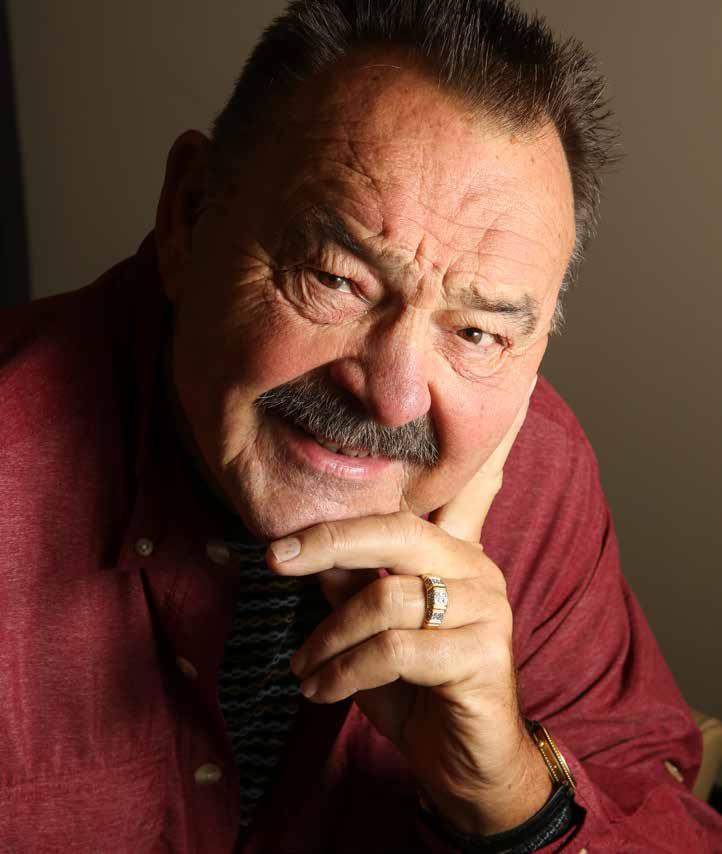
city has softened. Chicago is no longer, as Nelson Algren wrote in “City on the Make,” “a fighter’s town.” Rahm Emanuel tried to play tough guy and where did that get him?
But in spite of that, and for all of the worldclass-city pretensions, this is in some corners not unlike the place where Butkus was born and came of age.
The late Jeannie Morris was once married to Butkus’ teammate Johnny Morris, who once said, “I used to be afraid of Dick Butkus — and he was on my team.”
A few years ago Jeannie told me, “Football is a strange game, perhaps the most human of all sports because it is filled with contradictions: intricate and simple, vicious and artful, base and honorable. Like life at its headiest, football is all about risk. Chicago is a Bears town, and I do think that ‘city of big shoulders’ thing has resonance. Chicagoans like tough mayors too. And they love a good fight.”
On game days, some venerable taverns are still jammed with regular folks, some recalling the glory of a Super Bowl long past and, over the past few days, alive with Dick Butkus tales.
Yes, it is sad that he died but, hell, didn’t we have him for a wonderful while?
INTRODUCTION • 7
LEFT: Former Chicago Bear Dick Butkus at his home in Chicago. CHRIS WALKER / CHICAGO TRIBUNE
MALCOLM EMMONS / USA TODAY SPORTS
OPPOSITE: Dick Butkus, center, is shown with his family, from left: Nikki, 6; Butkus holding son Matt, 20 months; Helen, his wife; and son Ricky, age 5 at their home in Chicago Heights, Oct. 24, 1972.
LARRY STODDARD / ASSOCIATED PRESS

8 • BUTKUS
RIGHT: Chicago Bears linebacker Dick Butkus (51) on the sidelines during the game against the Minnesota Vikings at Soldier Field in Chicago on Sept. 23, 1973.
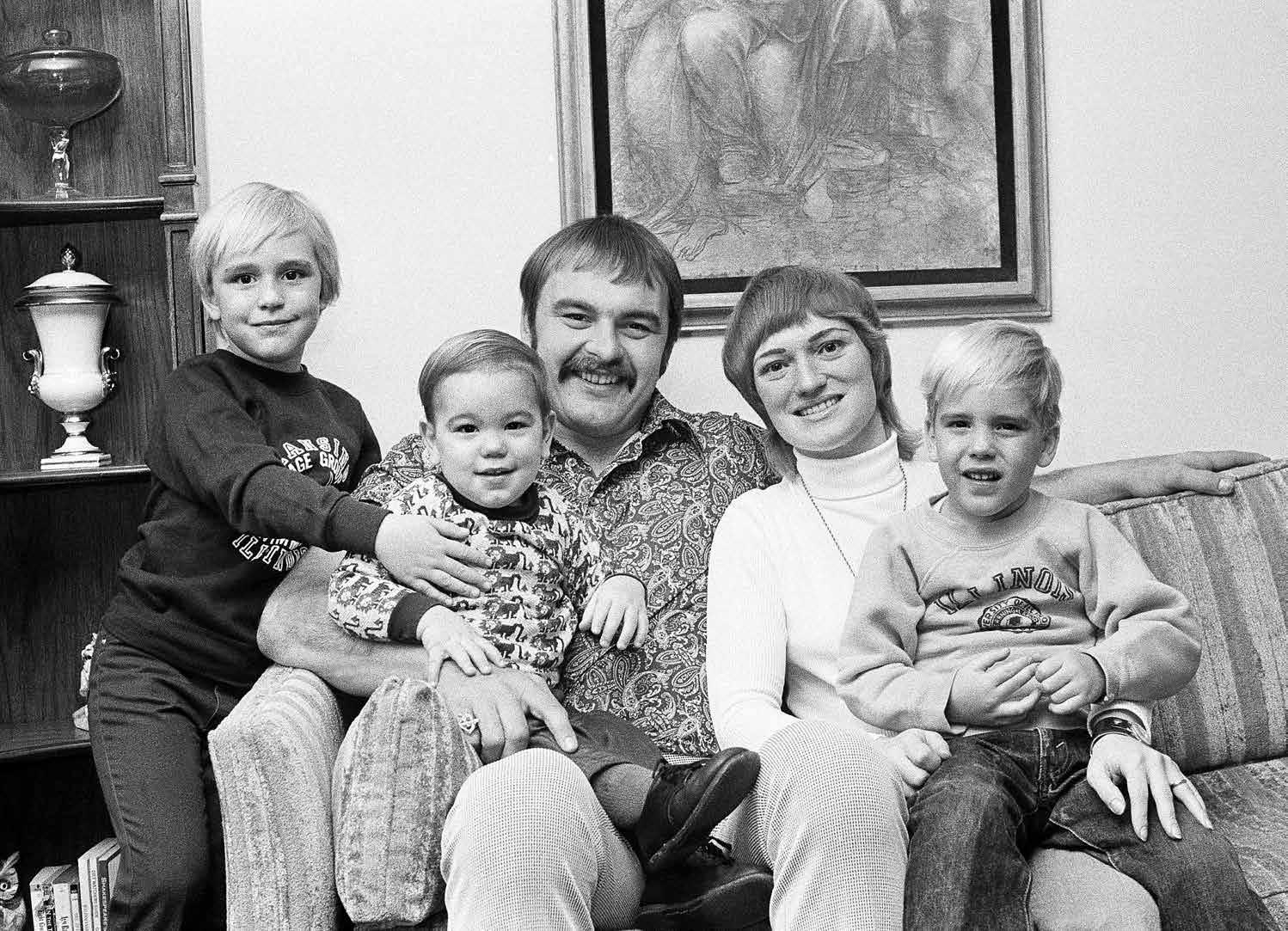
INTRODUCTION • 9
THE EARLY DAYS
Dick Butkus is key to Vocational’s hopes
Fullback threat to Lane line in Finals
JOHN LEUSCH, CHICAGO TRIBUNE • NOV. 19,
1959
No one will dispute the fact that the smartest move made by Bernie O’Brien in his three years as head football coach at Vocational High School was the switching of Dick Butkus from tackle to fullback at the start of this season.
And no one will dispute the fact that Butkus will be the man which Lane Tech’s college sized line will have to concentrate on Saturday in the Public League championship battle in Soldiers’ Field.
Butkus only a Junior
Butkus, altho only a junior, is perhaps the most talented football player performing in the Public League this season. In addition to being Vocational’s most dependable ball carrier, best blocker, and best kicker, the 6 foot 3 inch, 222 pounder is a good passer and pass receiver, and has been credited with
making almost 70 per cent of the tackles in each of the Cavaliers’ eight victories in an unbeaten season thus far.
Dick kicks off, punts, and kicks extra points. His 26-yard field goal beat Taft, 3 to 0, in the semifinals of the league playoffs last week.
One of the reasons Butkus was switched to fullback this season was that the returning veteran at the position enlisted in the navy last summer. Dick, who played only defense last season, is averaging 5 yards per carry. He is middle linebacker on defense.
10 other good players
Some observers have labeled Vocational a one man team. But it takes 11 players to constitute a football team, and Vocational has 10 other good ones.
Butkus is surrounded in the backfields by
Peter Basile and Ron Craig, a pair of fleet, 150 pound halfbacks, and Ray Scott, a smart junior quarterback.
Vocational’s offensive line, which averages 191 pounds, has Paul Cipich and Ed Angus at ends, Andrew Kracik and Tim Tidmarsh at tackles, Gerald Nemeth and Jim Fliris at guards, and Ernie Tisza at center.
Last title in 1955
The defensive forward wall, which averages 193 pounds, finds Cipich and Angus at ends, Kracik and Phil Cherep at tackles, and Nemeth and Ray Mussato at guards.
Vocational won its last league championship in 1955, beating Lane, 13 to 6. Last year the Cavaliers lost to Austin in the title battle, 12 to 6.
OPPOSITE: Chicago Vocational has only one Dick Butkus — for which opponents are thankful. Through a clever work, here’s a composite photo of CVS’ 6-3, 230-pound all-state fullback, as a runner, passer and a kicker on Oct. 19, 1960. CHICAGO TRIBUNE

10 • BUTKUS
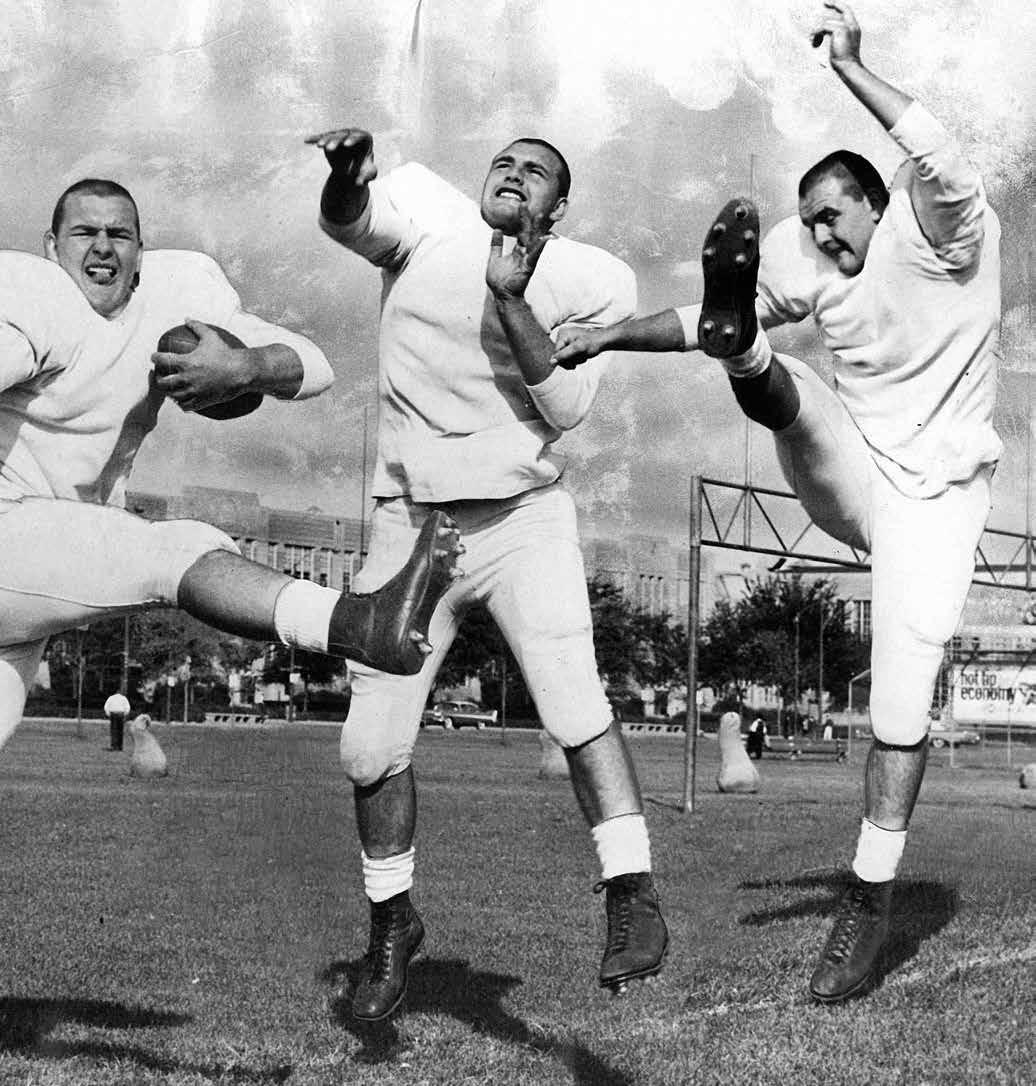
READER LETTER
An admirable player
I grew up on the Southwest Side of Chicago and remember Dick Butkus very well, from being a star at Chicago Vocational High School, as well as at the University of Illinois and with the Bears.
A warm memory for me is when we attended a Chicago Charities College All-Star Game against the Cleveland Browns, if memory serves me right. It was one of the greatest fullbacks, Jim Brown, against what would become one of the greatest middle linebackers.
I assume Brown gained more than 100 yards, but what I do remember is Butkus running up to Brown at game’s end to shake his hand.
“Defensively, two sophomores, Rich Bertette, halfback, and Dick Butkus, 6-3, 195-pound center, are outstanding.”
Chicago Tribune, Oct. 23, 1958, on Vocational players at the start of the season
THE EARLY DAYS • 11
Mitch Fox, Glen Ellyn
“The play of Dick Butkus of Chicago Vocational High School will be closely watched. Butkus, 6-foot-3-inch, 234pound center and linebacker, is being counted on to lead the Illini resurgence. Because of an abundance of sophomore linemen, (Illinois coach Pete) Elliot plans to use platoon substitutions for the first time.”
Chicago Tribune, Sept. 29, 1962
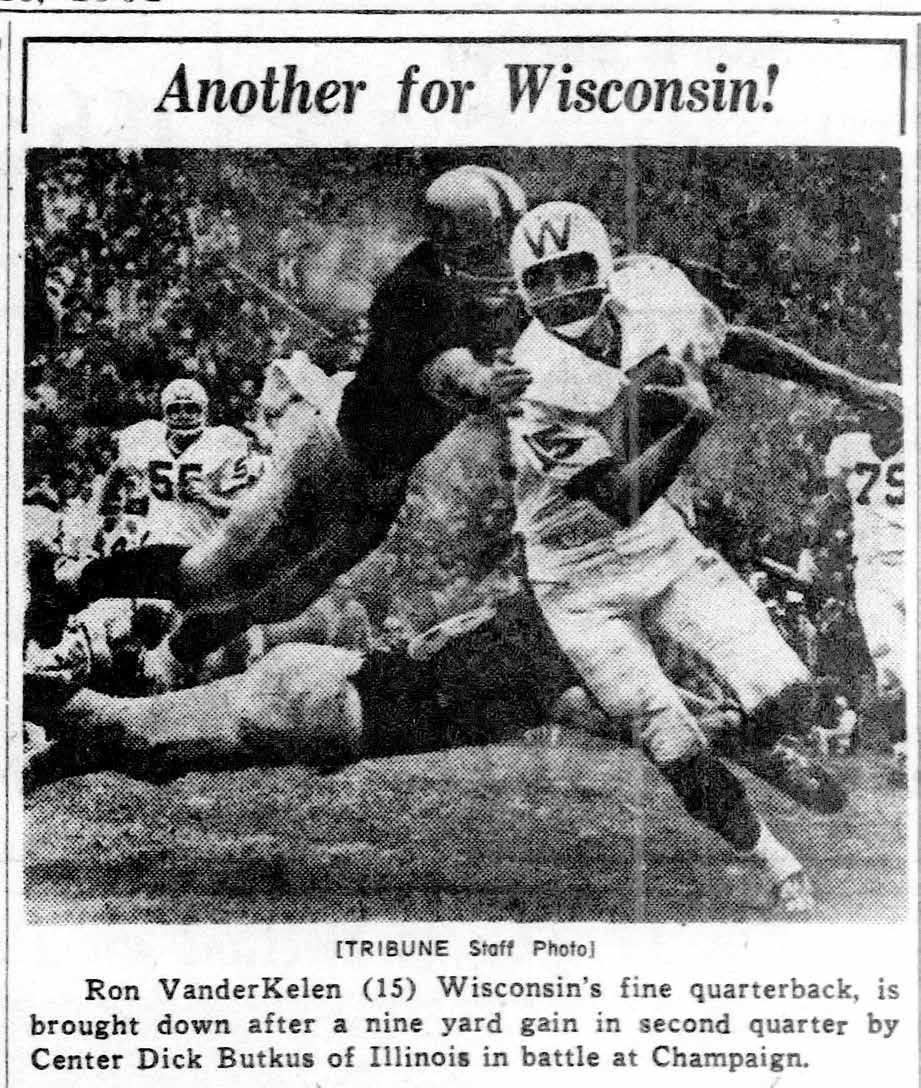
12 • BUTKUS COLLEGE CHICAGO TRIBUNE

“When it seemed that superior manpower and a crushing weight advantage of the Spartan forwards would avert a disaster, Dick Butkus a 234-pound center who played fullback for Chicago’s Vocational High School picked off a Hailey pitch late in the fourth quarter. That saved the game.”
Edward Prell, Chicago Tribune, Nov. 25, 1962
THE EARLY DAYS • 13
LEFT: Dick Butkus, Illini center and linebacker, in his uniform for a promotional photo on the football field.
COURTESY OF THE UNIVERSITY OF ILLINOIS ARCHIVES
THE 1965 NFL DRAFT

20 • BUTKUS
Chicagoan Butkus faces big decision on Draft
CHICAGO TRIBUNE • NOV. 29, 1964
New York — “I hate to make a decision — you see, I don’t want to hurt anybody.”
That was the quandary today of Dick Butkus of the University of Illinois, a gentle giant who like a host of other college football stars found himself in the middle of a vicious tug-of-war between rival professional leagues.
The All-America center and linebacker was the first choice of the Chicago Bears of the National Football League and also
of Denver in the rival American League.
Chicago’s my home and, all things being equal, I probably would prefer to play with the Bears,” the massive athlete said. “But there are other things to be considered.
‘It’s still wide open’
“Most people think that I already am sewed up for the Bears. They can think it if they want to, but it isn’t so. As far as I’m concerned, it’s still wide open.”
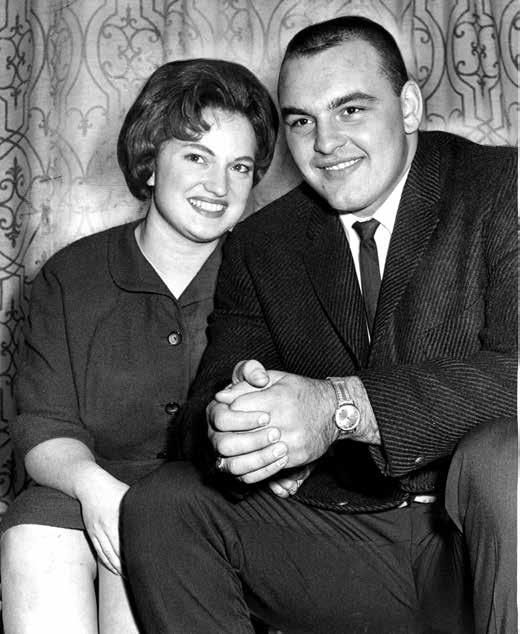
Butkus is here with members of the coaches’
All-Star team picked for a magazine. Ham-like hands protruded from a neat blue blazer and muscles of a bull-like neck strained at an 18-inch shirt collar as he tried vainly to relax in his hotel room.
Radio, television, and newspapermen paraded
constantly in and out.
Butkus’ decision probably has been complicated by reports that the Denver franchise may be moved to his back yard — Chicago.
“It worries me,” the powerful defensive ace said. “Regardless of which one I pick, I’ll make the other one mad. I don’t want anybody to be mad at me.”
He insisted that he would not be swayed by big bonus offers.
“I don’t mean to say I’m not interested in money — I am,” he said. “But the main thing I want is security. I’d like a long-term contract if possible. I don’t need a lot of money that badly.”
With a boyish candor, he said he also was worried about what his teammates might think if he got a fat bonus, such as the $100,000 reportedly given [to] Scott Appleton of Texas by Houston last year.
“It would be in all the papers, and there would be a lot of fellows on the team who had been there a long time and weren’t
making as much as I was, and they’d resent it,” Butkus added.
Fears Prima Donna tag
“If that happened, I think I’d rather quit. I don’t want to be a prima donna. I want to be a team man. And I’d play for nothing if it took that to do it.”
Butkus said he hoped that older players in pro football would be charitable to the new crop of rookies.
“We’re just lucky because of the year we were born,” he said. “We came along when there was a lot of television money, and it’s a players’ market, because the pro leagues are fighting each other. It’ll level out in five years.
“I don’t care about making a big killing quick. I want to play pro football because I love it. I want to be just one of the guys — I know there are a lot of fellows much better than I am.
“To tell the truth, I’d rather go in as a nobody, and prove myself.”
LEFT: Dick Butkus and his wife, Helen, greet the Chicago press at a brunch in the La Salle Hotel after the much-ballyhooed Illinois linebacker signed a contract with the Bears. CHICAGO TRIBUNE
OPPOSITE: Dick Butkus, University of Illinois center and linebacker, and NFL draft pick of the Chicago Bears, is shown in New York, Nov. 28, 1964. JACOB HARRIS / ASSOCIATED PRESS
THE EARLY DAYS • 21
WBears score 17–16 upset over Rams
Chicago defense meets late challenge
GEORGE STRICKLER, CHICAGO TRIBUNE • DEC. 9, 1968
Los Angeles — Greatness came to young Jim Dooley’s crippled legions in the smog shrouded Coliseum today when they choked off a dramatic last-minute rally by the powerful Los Angeles Rams to triumph, 17 to 16, before 68,368 hysterical National Football League fans.
Only one minute remained and veteran Bruce Gossett, one of football’s premier place kickers, was waiting expectantly on the sideline when the Bear defense went out the last time to climax a heroic performance.
Gossett previously had beaten Green Bay and New York in the final minute for Los Angeles with field goals and he had tied hated rival San Francisco with a successful attempt in the final three seconds. His talented toe had also defeated Detroit. All he needed was a fair chance from somewhere around the 40-yard line.
Chance never comes
But the Bear defense never let Gossett nor the Rams get within striking distance in that final thrill-packed minute and they left the Coliseum still alive in the championship race while the Rams, beaten for only the second time this season, were definitely eliminated as contenders.
It was the Bears’ seventh victory against six defeats and kept them in a tie with the Minnesota Vikings for first place in the Central division. It made the Green Bay
game next Sunday in Wrigley Field doubly important for the Bears, who now have a chance to enter the playoffs and share in the prize money.
Fourteen-point underdogs, the Bears carried the fight to the highly regarded Rams from the opening kickoff.
They received, marched 59 yards in 11 plays, and took a 3 to 0 lead on Mac Percival’s 20-yard field goal. A fumble set the Rams up for a touchdown from the 1-yard line by Willie Ellison in the second period.
Rams lose gamble
But then the Rams took a calculated risk, and after a flat shot on the kickoff had rolled out of bounds, Gossett kicked high and deep to Clarence Childs. Dick Butkus retreated to field the kickoff, then handed the ball to Childs.
Childs brought it back 88 yards to the 2-yard line and Brian Piccolo, the hard hammering replacement for the injured Gale Sayers, went over to regain the lead. The embattled Bears never surrendered it again.
They added a touchdown in the third period after Butkus, one of a dozen heroes among Bear defensive stalwarts, had intercepted a pass, and led, 17 to 7. But there on, the fates that have dealt them nothing but the back of a cold hand all year, stepped in and what had been a cut and dried decision suddenly became one of the most tense and
dramatic encounters of the season.
Los Angeles blocked two of Jon Kilgore’s punts. One bounded out of the end zone for a safety to make it 17 to 9 and the other set up the Rams on the Bears’ 16-yard line. From where they went on to score the final touchdown in four plays. Roman Gabriel, the Rams’ big quarterback, got it on a rollout around the Bears’ left flank, ducking tackles by Butkus and Rich Petitbon to finish just inside the flag at the corner of the end zone. Bear heroes were as numerous as the names on the roster. Percival provided the winning margin with his two extra points and his field goal. Piccolo scored the first touchdown on a 2-yard burst off tackle after being met solidly and cleanly at the line of scrimmage by linebacker Myron Pottios, the old Notre Dame hell raiser. The other touchdown was scored by Jack Concannon, who had what must be his finest day in professional football. Jack went 4 yards on a rollout, following an escort that was not needed. The Rams were completely fooled by the maneuver.
But victory belonged to the defense. Dick Evey, Frank Cornish, Petitbon, Joe and Rosy Taylor, Doug Buffone, Jim Purnell, Bennie McRae, and Ed O’Bradovich all turned in superb performances. O’Bradovich, in particular, rose to the heights in this contest the Bears’ figured was worth $5,000 a man in playoff loot. Big Ed, the club’s fashion plate, played as if his grocer and his landlord were
42 • BUTKUS
LOS ANGELES RAMS
@
17–16 SCORING RECAP 1 2 3 4 Total Bears 3 7 7 0 17 Rams 0 7 2 7 16 DEC
8, 1968
foreclosing.
But the most satisfying aspect of the victory was one the Bears were savoring in silence. Their young coach had outcoached the Rams’ George Allen, another young man who once was a part of the Bear entourage.
Surprising strategy
Dooley had decided to run inside on the Rams. No one runs inside on Los Angeles, at least not regularly. But the Bears did it all day, sending Piccolo and Ronnie Bull over the territory where Merlin Olsen and Dave Jones, the most fearsome of the famous Fearsome Foursome, were on patrol. Piccolo carried 22 times for 62 yards, not exactly startling statistics, but good enough to win over a club that had expected to wind up in the Super Bowl next month.
Ram excuses may be plentiful in the followups. There is the Hong Kong flu that struck 24 during the week. But the Bears also had the Hong Kong flu. The difference was that the Bears did not publicize it. Then the officials, who helped the Bears set a National League record for penalties in one season, got themselves confused with all the kerchief dropping and brought about what the Rams interpret as a shortage of downs on their final desperate attempt to get Gossett within victory distance.
The Bears were assessed with 105 yards for 12 infractions, bringing their total for the season to 1,125 for 13 games. [They have one more to go]. The total is 18 yards more than the record they set in 1951. Fifteen of those yards came on a questionable fair catch ruling in the fourth quarter when Rudy Kuechenberg hit Defender Ron Smith just as the Ram safety man took in Kilgore’s punt. No one in the press box saw a fair catch signal from Smith nor from the other Ram
safetyman, but an official said he did, and the Rams were set up on the Bears’ 34-yard line.
Gossett
misses kick
It availed the Rams nothing, however. Gossett finally had to come in to place kick and missed from the 35-yard line. This was not the only chance the Rams had. For instance the defense choked them off at the 7 when they tried to capitalize on Clarence Williams’ recovery of a pass that bounced around in Bob Wallace’s hands. The method was simple. Evey just hit Tommy Mason so hard, Mason and the ball went in opposite directions. The ubiquitous Mr. Butkus — it’s almost always Butkus — recovered. There were other opportunities for the Rams, too. But today the team that would not be beaten, wasn’t. And Jones, Los Angeles’ candidate for the perfect defensive specialist, must long remember the job that Bob Wetoska, when he wasn’t on the sidelines, getting medical attention, and young Wayne Mass did on him.
Two and a half minutes remained when Gabriel went over to narrow the gap to a point and the 66,368 [66,212 of which must have been Ram partisans] got set to see another heart-stopping Ram rally.
Gossett kicked off to Childs and the former New York Giant who has been on the Bears’ active squad for only three games and has run back a kickoff 50 yards or more in each of the three contests, got back only 23 yards to the Bears’ 33.
Bears keep cool
Ram adherents considered his failure a major Ram achievement. But even with only a one-point lead and all the excitement in the arena, the Bears, or more specifically Concannon, did not panic. They continued
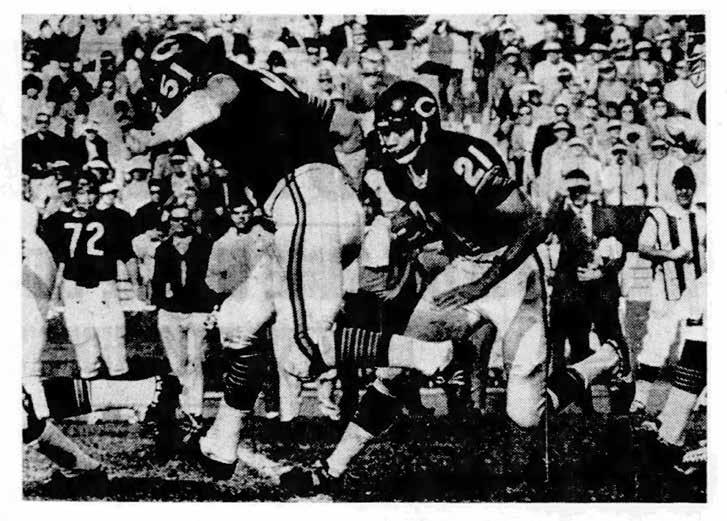
to go for short yardage, inside the tackles. Eventually Kilgore had to punt.
Gabriel, who had been flattened by Purnell and lifted from the game in the second quarter, got into the huddle with one minute remaining and the ball on Los Angeles’ 23-yard line. Joe Taylor broke up his long pass to Jack Snow on first down. Fifty-five seconds remained.
Gabriel hit Mike Dennis, a rookie 207pound running back from Mississippi, for 13 yards. The next one was high and deep to Hal Jackson, a sprinting rookie from Jackson State. But Jackson, with all his speed, was not too fast for Joe Taylor and it was second down with 40 seconds left, still back on the 36-yard line.
Gabriel was getting excellent protection at this stage. The Bears were only rushing four men. Gabriel went to tight end Billy Truax, who was in the clear, but Gabriel overthrew
ABOVE: Cecil Turner (21) of the Bears follows the blocking of Dick Butkus en route to a 16-yard return of the opening kickoff in a game against the Rams in Los Angeles on Dec 8, 1968. The 17–16 Chicago victory knocked Los Angeles out of the NFL championship race. George Halas was awarded an honorary game ball and linebacker Dick Butkus was given the official game ball. CHICAGO TRIBUNE
THE NFL YEARS • 43
him. Then he found Snow for 32 yards and a first down on the Bears’ 32. Bedlam reigned. Gossett flexed his right leg in a couple of practice swings along the sidelines.
Another shot to Snow was knocked down by Butkus and J. Taylor. There was another of those official interruptions after the play, however, and when referee Norm Schachter had finished conferring, cogitating and pacing, the Rams were set back 15 yards to their 47-yard line.
The official decision, as far as it was possible for anyone to find out, was a holding call against Ram guard Tom Mack. It came on a first-down play and under all normal deduction, in the absence of any communications with Schacter, the next play also should have been first down.
But they played it as second down and it was third down almost immediately when McRae knocked a long pass out of Wendell Tucker’s hands deep in Bear territory. Mason fell in the clear on the next play and Gabriel’s pass sailed over him. Finally, with 10 seconds remaining on fourth down, officially, but only third as far as the Rams were concerned, J. Taylor and rookie Major Hazelton stayed with the speedy Jackson all the way to the goal line, where they batted away Gabriel’s pass.
Gossett sat down, disconsolate. The Ram bubble had burst. The underdog had done it again. And it couldn’t have happened to a more heroic bunch of unfortunates.
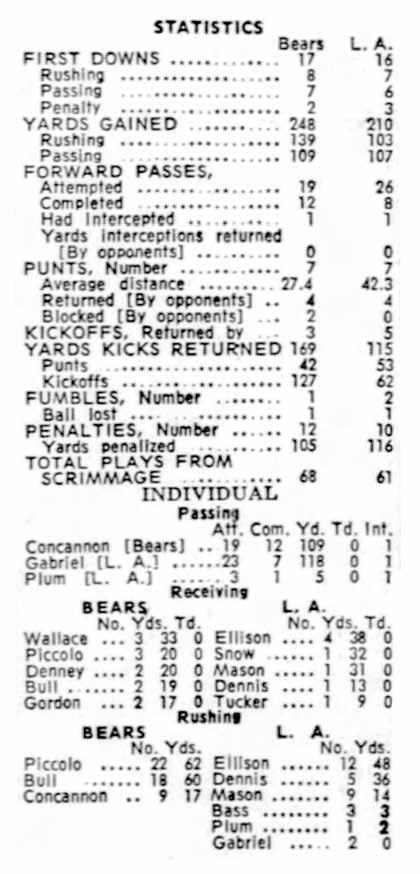
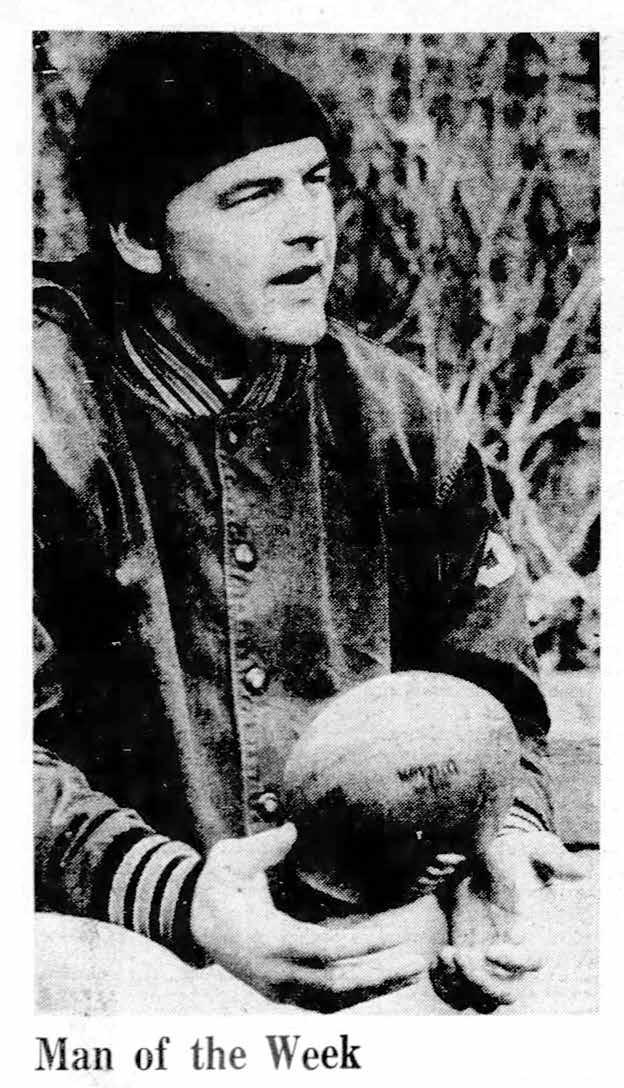
44 • BUTKUS
RIGHT: Linebacker Dick Butkus of the Bears during an interview in Wrigley Field after he was named defensive player of the week by Associated Press for his performance against the Rams on Dec. 8, 1968. CHICAGO TRIBUNE
CHICAGO TRIBUNE
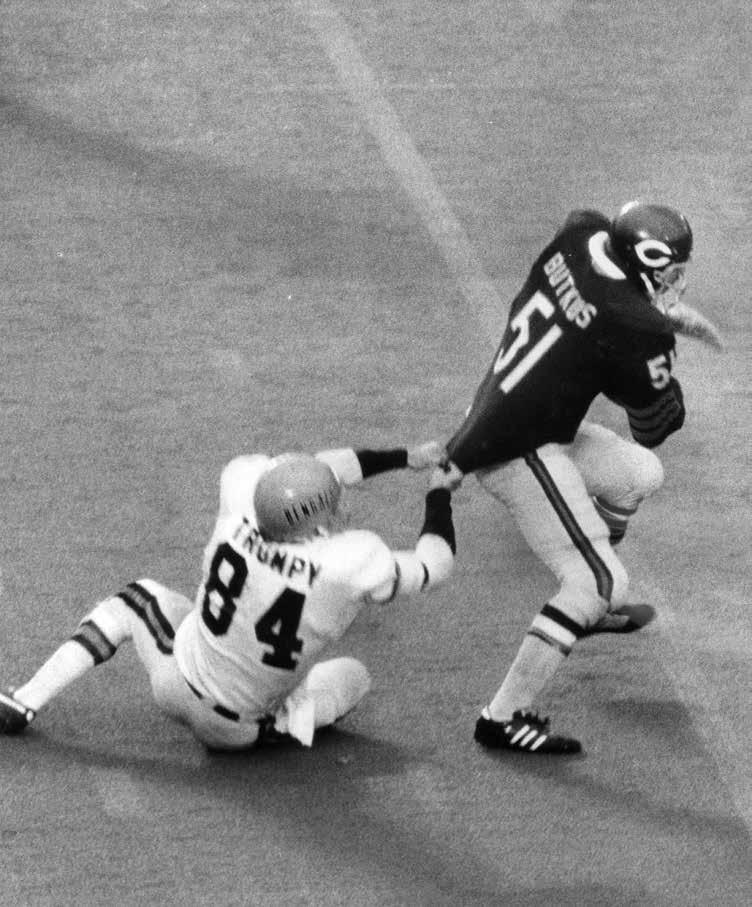
Honor Butkus for upset role
Bear named as Defensive Star of Week
After a two-day layoff, the Bears yesterday began preparations for Sunday’s Wrigley Field final with Green Bay which they hope will be a springboard to the post-season playoffs.
And as coach Jim Dooley’s men trotted out onto the surprisingly green playing turf in Wrigley Field on an unseasonably mild December day, they learned that one of their members had been honored for his performance in last Sunday’s thrilling victory in Los Angeles.
Modest about honor
Dick Butkus, the Bears’ fiery middle linebacker, was named defensive player of the week by the Associated Press for his demonstration of winning football against the Rams.
Butkus, who intercepted a pass and recovered a fumble in addition to putting on a fierce, one-man display of helmetrattling, was typically modest as he accepted congratulations.
“Actually, I don’t know that it was even my best game of the season,” said the one-time Illinois star. “But I appreciate the honor very much. Everybody had a great day Sunday — Dick Evey, Jim Purnell, and Doug Buffone especially. It was a big day for the team.”
Dooley, commenting on Butkus’ performance against the Rams, declared, “Dick is a pro every game. He is consistently outstanding. He got more help this time than he had been getting. It’s the kind of team effort we’re going to need against Green Bay.”
Cooper Rollow, Chicago Tribune, Dec. 12, 1968
THE NFL YEARS • 45
FROM THE CHICAGO TRIBUNE
ABOVE: Butkus defends an attack from Bengals tight end Bob Trumpy.
CHICAGO TRIBUNE
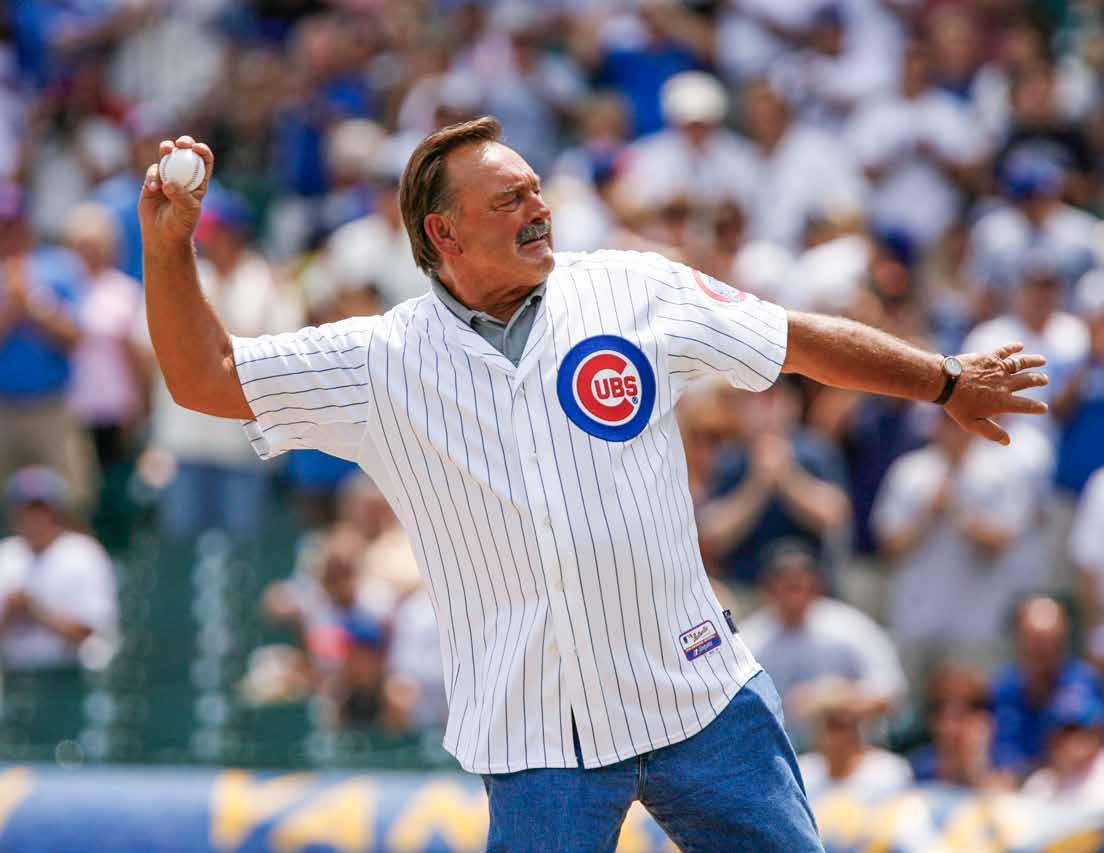
RETIREMENT
Bear for all seasons
DAN POMPEI, CHICAGO TRIBUNE • DEC. 15, 2012
In August 2001, Dick Butkus was approached with a deal.
If he would record a radio advertisement, he would be given an EBCT heart scan. The scan normally would have cost about $15,000 and insurance didn’t cover it.
“What the hell,” Butkus said. “I hadn’t been to a doctor in a long time.”
He expected a clean bill of health because he had no signs of trouble.
The results were disturbing. Two days later, Butkus had quintuple-bypass surgery.
Afterward, he saw the heart surgeon. “Come on,” Butkus said. “Was it really that bad?”
Said the doctor, “You had one foot in the grave and one on a banana peel. In 30 days it could have been over.”
Instead of slipping into a grave, Dick Butkus lived. On Dec. 9, he celebrated his 70th birthday.
That was Butkus then
He was 13 pounds, 6 ounces at birth, the eighth Butkus kid but the first born in a hospital. Good thing too; he was a “blue baby” and needed to be incubated for a week.
At his family’s four-room house at 10324
S. Lowe Ave. in Roseland on the South Side, Butkus shared an 8-by-10 room with four brothers.
His mother didn’t cut his hair for the first three years of his life. She was hoping for a girl.
Emma Butkus, the tough, spirited matriarch, worked 50 hours a week at Monarch Laundry and still managed to tend to her army.
Her husband, Don, an electrician, was a gentle survivor of concentration camps but a man of fierce determination. The
gave his parents his $6,000 signing bonus. They bought burial plots.
He also tried to buy them furniture, but they refused. They did accept live chickens.
Despite being crowded, the Butkus house was well cared for. The white-picket fence out front always seemed newly painted.
This is Butkus now
About eight years ago, curiosity got the better of Butkus, and he made a trip back to Roseland. The house was still there, but the fence was gone.
“He didn’t look anybody in the eye.”
Rick Bertetto, childhood friend of Dick Butkus
Lithuanian immigrant was uncomfortable with the English language and very reticent. His youngest son didn’t talk much, either, because he was so shy.
“He would look down all the time,” said Rick Bertetto, who met Butkus when they were registering for kindergarten, was nicknamed “Butkus’ Mouthpiece” in high school and remains as close to him as anyone.
“He didn’t look anybody in the eye.”
When Butkus signed with the Bears, he
The current owner told him she should have kept the fence up and that the neighborhood had become dangerous. He could see.
Home these days is the city where “Gidget” was filmed. Of the nearly 13,000 residents of Malibu, Calif., nearly half might have been on your TV screen. Butkus moved there in 1982 to pursue an acting career.
The modern glass and wood Butkus home sits on a bluff overlooking the Pacific Ocean
and is as far from South Lowe as Mercury is from Pluto.
“I never thought this kid would leave the South Side of Chicago,” said Ed O’Bradovich, his former teammate and roommate with the Bears. “In my wildest dreams, I never would have believed he would have moved to California of all places.”
But where Butkus lives is not a reflection of who the man has become; rather it is a reflection of what was convenient for the man.
“Malibu has been good to him, but I don’t think he ever saw himself as a California guy,” Bertetto said. “He still identifies with working-class guys. Any time we are in a restaurant, he always gives me some money to slip to the bus boys. Those are the kind of people he is concerned about.”
That was Butkus then
By the fifth grade, Butkus knew. He competed in swimming, water polo and baseball, but he was obsessed and driven to succeed at a sport he had played only in the sandlot.
At Chicago Vocational High School he was a dominant fullback, but he preferred linebacker, where he made 70 percent of his team’s tackles.
RETIREMENT • 113
OPPOSITE:
the first
to a
BONNIE TRAFELET / CHICAGO TRIBUNE
Dick Butkus throws out
pitch prior
Cubs-Giants game at Wrigley Field.
At the University of Illinois, Butkus was an All-American twice and won the Tribune’s Silver Football as the Big Ten’s best player in 1963. The Bears picked him third overall in the 1965 NFL draft, one pick ahead of Gale Sayers.
He became an eight-time Pro Bowler and a first-ballot Hall of Famer. In 1970, the New York Times asked 22 NFL head coaches to name five players they would pick to start a team. More chose Butkus than any other player.
Of all the things Butkus can be proud of, he is proudest of having a vision at age 10 that he willed into reality.
This is Butkus now
Butkus enjoys telling stories the way older men do. But he often tells them with the mischievous grin of a young man.
He doesn’t look as tall as his listed height of 6-foot-3 anymore. He is maybe 15 pounds heavier than his playing weight of 250.
He will celebrate his 50th wedding anniversary with his high school sweetheart, Helen, in July.
“He’s crazy about her,” said former Bear Doug Buffone, who also roomed with Butkus for a time. “She has been right there with him every step of the way. And he is true blue, always has been.”
Helen and Dick are mom and dad to Nikki, 46, Rick, 45, and Matt, 40. And they are grandparents to Ian, 13, Gavin, 8, Ricky, 1, and Raymond, 9 months. They enjoy watching their grandkids’ sporting events quietly from the stands.
In his free time, Butkus likes to watch Turner Classic Movies. Jimmy Cagney,
Humphrey Bogart, Jimmy Stewart, Errol Flynn and Myrna Loy are among his favorite stars.
For him, the oldies are best. But he watched “Titanic” again recently.
“That movie blows me away with that damn song and everything,” he said.
When he drives, he listens to The Great Courses, lessons from leading professors.
And he lives for a good practical joke.
When Butkus visited Mayor Richard M. Daley with some friends and lined up behind the mayor’s desk for a photo, the silence was broken by a muffled, trumpet-like sound that startled and appalled others in the room — Butkus’ fart maker.
He carries one in his briefcase and another in his golf bag.
That was Butkus then
Lions running back Altie Taylor once saw Butkus charging at him full speed and stepped out of bounds before he could be hit. This so angered Butkus that he kept chasing Taylor out of bounds. In fact, he chased him clear into the stands at Soldier Field.
When Taylor finally got back to the huddle, he told teammate Charlie Sanders, “That man’s crazy.”
An official in a 1971 Bears-Dolphins game might have thought the same thing. He popped out of a pile holding out his finger, which was covered with blood. Butkus allegedly walked away with a sly grin and reddish teeth.
“I used to line up at the outside linebacker position and look inside,” Buffone said. “I’d see him hulking over the center. He always had a little blood trickling down his face. I
don’t know if he would cut himself or what. But I’d always say to myself, ‘Thank you, Lord, he’s on my side.’”
In October 1971, Playboy described Butkus: “He’s the meanest, angriest, toughest, dirtiest son of a bitch in football. An animal, a savage, subhuman.”
Such perceptions never sat well with Butkus. But he didn’t do much to change them.
In his playing days, Butkus once told an interviewer, “I sometimes have a dream where I hit a man so hard his head pops off and rolls downfield.”
This is Butkus now
Butkus laughs at the image he helped create.
“I was just saying (expletive) to go along with what everybody wanted,” he said. “It actually was playing a role.”
Little known fact: Butkus used to pray that no one would get hurt in his games — even opponents.
Butkus has a profound way of looking at football’s role in his life.
“He always said God blessed him to have exactly what he needed to be a linebacker — short legs and a long torso,” Bertetto said. “He felt he always had to respect that.”
Butkus is a parishioner at Our Lady of Malibu and occasionally visits Serra Retreat, for which he helped raise money for a new chapel through a golf tournament.
However, he still doesn’t get it when he sees players from opposing teams praying together after games. Butkus, who refused to speak to certain rivals when they were teammates at the Pro Bowl, never will understand
fraternization between opponents.
When he would bring Butkus Award finalists together, he would shake his head when he saw them exchange phone numbers.
“What is that all about?” he said. “This is a (expletive) guy you might be playing against.”
No, Butkus has not mellowed with age. The rage he played with still bubbles beneath the surface, Bruce Banner-style.
“His wife was right,” Buffone said. “She said Dick was born mean.”
Ask the ESPN paper-pusher who tried to explain why his expense check was late after he did a cross-country trip for the network.
“I said, ‘Where’s my money?’ ” he said. “She said, ‘We’re a big company.’ I said, ‘What the (expletive). I don’t care. Get me my damn check now!’ I went off on her, screaming like crazy.”
Said Bertetto, “If somebody pisses him off, you don’t want to be around him.”
That was Butkus then
Defense wasn’t just about tackling to Butkus. It was about punishing.
“You mention his name, my body starts aching,” said Sanders, a Hall of Fame tight end.
In one memorable game at Soldier Field, Sanders hit Buffone square in the chops with a forearm on a crackback block, knocking out three of Buffone’s teeth. When Buffone came back to the sideline, bleeding profusely, Butkus wanted to know who was responsible.
Later in the game, when Sanders came across the middle with his eyes on a pass, Butkus drilled him in his chest, laying him out.
114 • BUTKUS
MARK J. TERRILL / ASSOCIATED PRESS
OPPOSITE: Former Chicago Bears star Dick Butkus is surrounded by football memorabilia at his home in Malibu, Calif., Jan.
6, 2000.
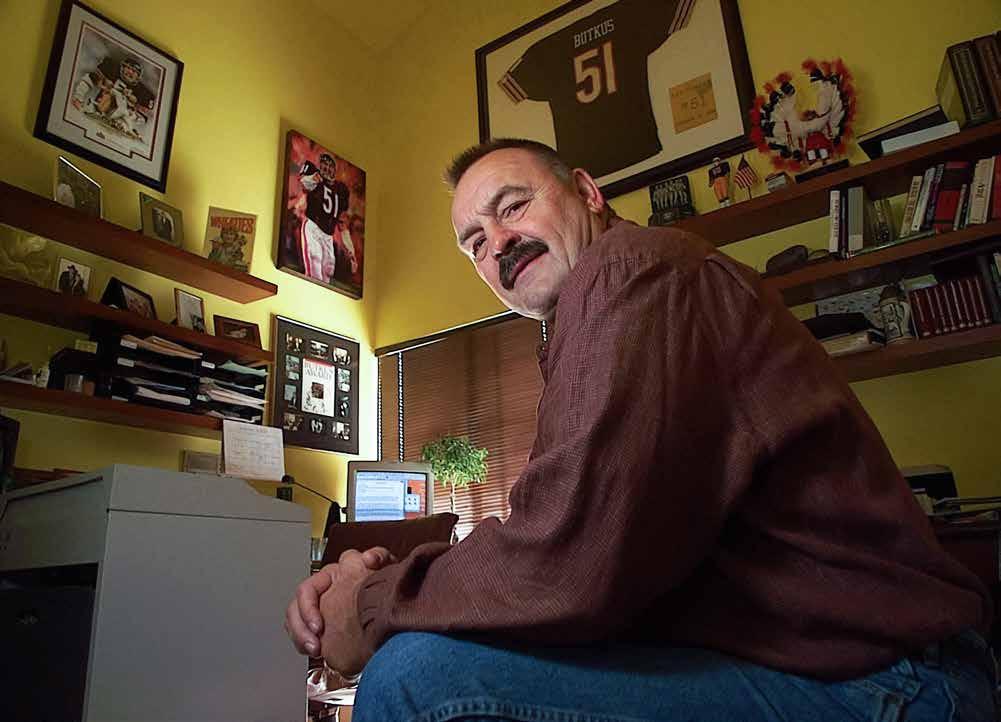
RETIREMENT • 115
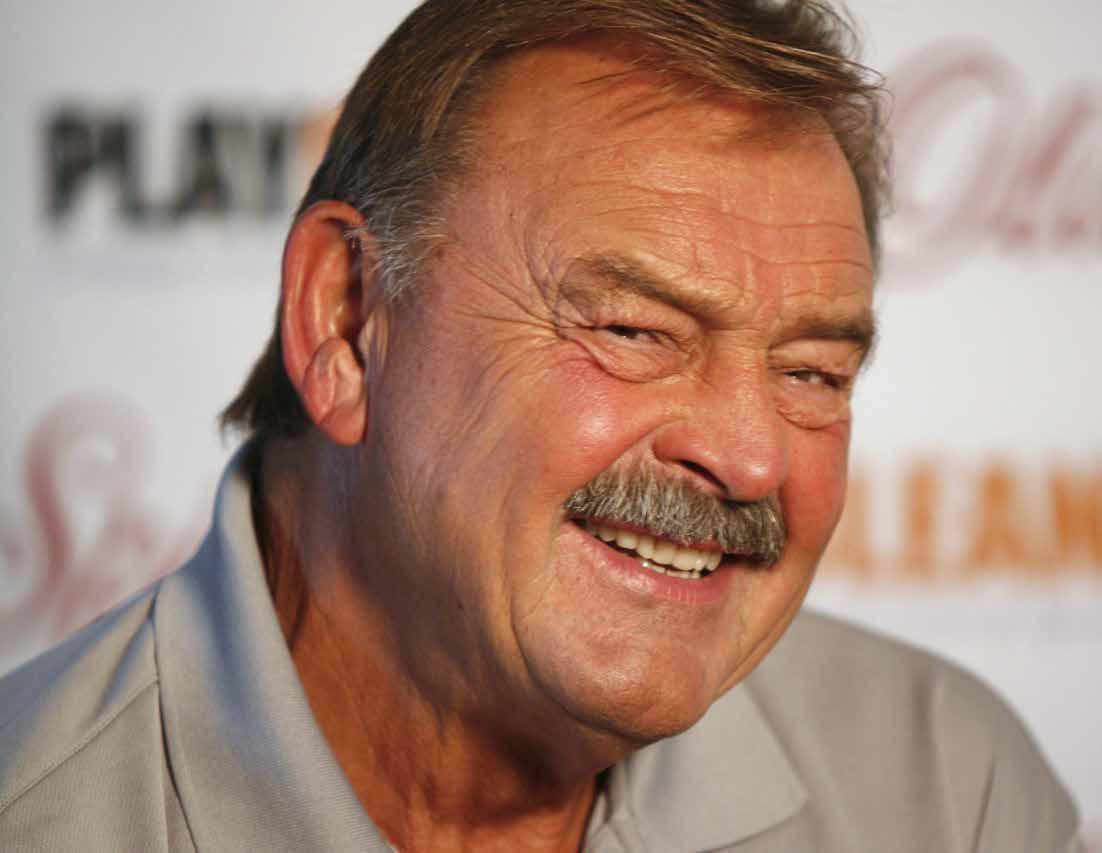
Butkus expects to add some color to Bears’ radio broadcasts
CHICAGO
TRIBUNE • APRIL 19, 1985
Dick Butkus and the Bears are back together. Once the team’s heart and soul, the former middle linebacker is returning as one of Bears’ radio voices for 1985.
The two parties didn’t see eye-to-eye after a knee injury ended Butkus’ career in 1973 and led to his suit against the club. Now he’s joining Jim Hart, the longtime St. Louis Cardinals’ quarterback who wound up his career with the Washington Redskins, as a color man alongside new play-by-play announcer Wayne Larrivee in the Bears’ return to WGN-AM (720).
Dan Fabian, WGN’s program manager, thinks three is just great, not too filling.
“I see Hart as more the analyst and Butkus the color man,” said Fabian. “Larrivee will be in absolute control of the pace and texture of the broadcast. I see Hart getting into strategy and Butkus being more the John Madden type. I would expect some interplay between Hart for the offense and Butkus for the defense.”
Larrivee is leaving the Kansas City Chiefs for the Bears’ job. Hart recently retired from
the Redskins. Butkus made room on his busy schedule of TV shows and commercials to get on the Bears’ bandwagon.
“I did it once with the Saints and I didn’t like it,” Butkus said. “I think it was because I didn’t like the team. I couldn’t get interested in a team like the Saints.”
Butkus will not be able to join Hart and Larrivee in the booth for every game because of his television taping schedule. In those cases, WGN plans to hook up with
Hart, who went to high school at Niles West, grew up listening to Jack Brickhouse and Irv Kupcinet broadcast the Bears on WGN. Although he will turn 41 April 29, Hart was ready to play another year if the Redskins had made it worth his while. “I still think I can play,” he said.
At the rate the Bears went through quarterbacks last season, Hart might have to change headsets at halftime and play. Greg Landry, age 38, was one of five quarterbacks
“I did it once with the Saints and I didn’t like it. I think it was because I didn’t like the team.”
Dick Butkus
Butkus via telephone as part of its 8 1/2hour game-day programming, either on the pregame or postgame portions.
During those games, Fabian said Butkus’ spot in the booth could be filled by someone else, presumably not Bubba Smith, Butkus’ polo-playing partner in TV commercials.
“If it hadn’t been the Bears, I don’t think I would have done it,” said Butkus.
to start for coach Mike Ditka last season.
“My teammates kidded me last season that I was in the wrong place,” said Hart, who played 17 years for the Cardinals.
Fabian said he got the idea to use three men in the booth after listening to Redskins’ broadcasts with analysts Sonny Jurgensen and Sam Huff.
“They get on each other’s cases once in
a while, give each other gas,” said Fabian.
“I think it can work,” said Hart. “I know Sonny never said anything negative about it. I would hope we could be clever and have a good time.”
“I don’t see any problem with it,” said Butkus. “A lot depends on the play-by-play man and if he throws it back and forth to us. I know I’ll have to go to school again to learn what they’re doing on defense.”
Fabian said the Bears had no objections to hiring Butkus, whose suit against them and former team physician, Dr. Ted Fox, was settled out of court. “They endorsed him with open arms,” said Fabian.
Fabian said WGN’s approach to Bears’ broadcasts will “recognize the reality of TV and that most people will choose to watch the games. We want to give them something they’re not getting on the tube that will cause them to want to listen to us while they’re watching.”
The new broadcast team will replace the WBBM-AM (780) tandem of Joe McConnell and Brad Palmer, who were with the club for eight years.
OPPOSITE: Former NFL player Dick Butkus hosts the “I Play Clean” rally at Soldier Field to educate about 300 area high school athletes about the dangers of anabolic steroids, July 11, 2008. MICHAEL TERCHA / CHICAGO TRIBUNE
RETIREMENT • 119 COMMENTATOR
Butkus glad he heeded Bear call to come home
CHICAGO TRIBUNE • SEPT. 23, 1985
Television commercials do foreshadow real life. At least that seems to be the case for Dick Butkus and his return to the Bears family.
Butkus did a public service spot promoting Chicago a few months ago. You remember the one, where Butkus, sitting in some faraway land, reflects longingly about all the great things in his hometown. The next scene shows Butkus getting out of a cab in front of one of his old hangouts. And who happens to be there, enjoying a brew with the boys? None other than Bears’ coach Mike Ditka. Artistic license, right?
“Oh, Louie,” Butkus says. No, wait a minute, that’s Carol Channing’s commercial. Anyway, the point is that Chicago called him home. The real thing happened when WGN radio acquired the Bears’ broadcast rights this year. They wanted a big name to make the package complete, and Butkus’ might be the biggest.
“They called and I thought about it,” Butkus said. I thought, well, maybe it wouldn’t be a bad idea. It’ll give me a chance to spend some time in Chicago, and it could be kind of fun.”
Butkus didn’t have any regrets after the Bears’ 33-24 victory over the Minnesota Vikings Thursday.
“He was really pumped up on the plane back to Chicago,” said the Bears’ play-byplay voice, Wayne Larrivee. “He really
seemed happy to be a part of it.”
Somehow, it seems fitting that Butkus should be with the Bears again. Actually, a part of him never really left when the middle linebacker retired in 1973. For nine Hall of Fame years, he symbolized the Bears with his fierce assaults on opposing players. The mere mention of the name Butkus, like Payton or Unitas, paints the complete picture.
Butkus left Chicago shortly after his retirement to go to Hollywood, where he does commercials and movies. He had brief
Butkus now makes the weekly commute from California so he can do the games with Larrivee and ex-St. Louis Cardinal quarterback Jim Hart. The Bears and the Washington Redskins are the only teams in the league with three men in the booth, and Larrivee admits it was tough at first.
“But I really think we came together when the regular season started,” Larrivee said.
“Dick and Jim are doing a great job.”
“I’m enjoying it,” Butkus said. “Wayne is very good in what he does, and Jim is a good guy to kid around with.”
“They were always telling me what to do. I didn’t go for that.”
Dick Butkus on his post-retirement broadcast stints
stints in broadcasting with the New Orleans Saints and the University of Illinois (his alma mater) among others. But he didn’t like it.
“They were always telling me what to do,” Butkus said. “I didn’t go for that.”
Butkus never figured he’d get behind the mike again. But the Bears situation was different. He rarely missed a game when they were on the West Coast.
“I’ve always followed them when they were on national television, too,” Butkus said. “I liked the idea of coming back to the Bears, with Ditka as the coach. If it was any other team, I wouldn’t have done it.”
Larrivee says Hart talks about the technical aspects of the game, while Butkus “gives us the perspective from down in the trenches.” For instance, in one game Butkus detailed his way of roughing a ballcarrier without getting penalized for a late hit. Kids, don’t try this at home.
Butkus said: “When you want to tackle a guy out of bounds, but it’s too late, hit the guy but pull your arms back. That way it looks like you’re trying to back off the guy. At the same time, you still get your shot in.”
The Bears games give Butkus a chance to get away from his acting, which still
remains his top priority. He missed the Dallas exhibition game because of a prior commitment and might have to miss a couple more during the season. Butkus got into the business through the Miller Lite beer ads, considered to be some of the best in the industry. However, he doesn’t expect he’ll do another one for them. “I haven’t heard from them in quite some time,” he said.
Butkus has done several television shows and has a movie called “Hamburger” coming out in December. He hopes to begin work on another one in October or November.
But for now, Butkus enjoys being close to football and the Bears again. He likes this Bears team, especially players like middle linebacker Mike Singletary and defensive tackles Steve McMichael and Dan Hampton. The defense as a whole fits Butkus’ image.
The difference, though, is the offense, Butkus says. He credits Ditka there.
“When I was playing, we didn’t have that closeness, because the offense left us on the field too long,” Butkus said. “The defense has always been hard-hitting, but now we’re seeing that on the offensive side. They’re playing more aggressive. It’s the character of the head coach rubbing off on the players. If they stay healthy, I don’t see why they can’t repeat and go to the NFC title game or further again.”
OPPOSITE: Former Chicago Bears great Dick Butkus waves after being recognized during the first period of Game 2 of the Stanley Cup Playoffs Western Conference semifinal between the Chicago Blackhawks and the Minnesota Wild at the United Center in Chicago on May 3, 2015.
120 • BUTKUS
NUCCIO DINUZZO / CHICAGO TRIBUNE
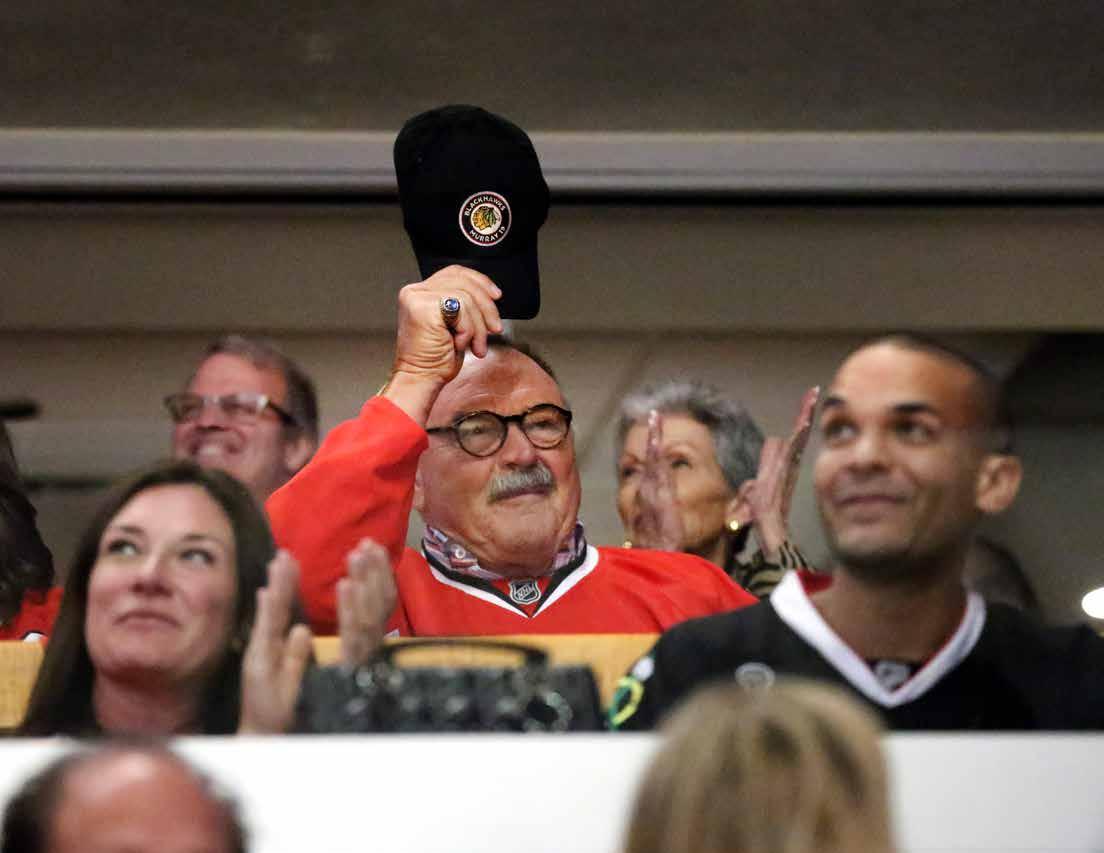

at 80
‘He was Chicago’s son’: Dick Butkus, the Hall of Fame Bears linebacker known for his toughness, dies
FRED MITCHELL, CHICAGO TRIBUNE • OCT. 5, 2023
Perhaps no player in the Chicago Bears’ 104-year history better epitomized the team’s tough and determined identity than Dick Butkus.
A product of Chicago’s working-class South Side and the University of Illinois, Butkus became a fierce Pro Football Hall of Fame linebacker before embarking on a modest but enduring entertainment career in Hollywood.
“After football, it was difficult for me to find what I liked second-best,” Butkus once told the Tribune. “Football was always my first love. That certainly didn’t mean I couldn’t find something else. And the proof of the pudding is where I have ended up today.
“I guess I could have been one of those guys who didn’t prepare to quit. But things happened and through hard work I found out that, hey, there are other things besides football.”
Butkus, 80, died “peacefully in his sleep overnight” at his home in Malibu, California, the Butkus family said Thursday.
In 2019, the Tribune ranked Butkus No.
2 in a list of the 100 greatest Bears.
“Dick was the ultimate Bear and one of the greatest players in NFL history. He was Chicago’s son,” Bears Chairman George McCaskey said in a statement. “He exuded what our great city is about and, not coincidently, what George Halas looked for
“He was a giant of a player, and a man, and we will always remember his giant love and dedication to the City of Chicago.”
Chicago Mayor Brandon Johnson
in a player: toughness, smarts, instincts, passion and leadership. He refused to accept anything less than the best from himself or from his teammates. When we dedicated the George Halas statue at our team headquarters, we asked Dick to speak at the ceremony because we knew he spoke for Papa Bear.
celebrated one last time by his many fans.”
Chicago Mayor Brandon Johnson, in a statement, said Butkus “embodied the strength and the tenacity of his hometown with every snap he played on the gridiron.”
“He was a true Monster of the Midway, but also an actor, a commentator and a statesman for all things representing our beloved blue and orange,” Johnson said.
“He was a giant of a player, and a man, and
“Dick had a gruff manner and maybe that kept some people from approaching him, but he actually had a soft touch. His legacy of philanthropy included a mission of ridding performance-enhancing drugs from sports and promoting heart health. His contributions to the game he loved will live forever and we are grateful he was able to be at our home opener this year to be
we will always remember his giant love and dedication to the City of Chicago.”
Born Richard Marvin Butkus on Dec. 9, 1942, he was the youngest of nine children of Lithuanian immigrants. His father, Don, was an electrician. His mother, Emma, worked in a laundry. Butkus grew up in the Roseland neighborhood and played high school football for coach Bernie O’Brien at Chicago Vocational.
At Illinois, Butkus played center and linebacker from 1962–64 and was a unanimous All-American in 1963 and ’64. In 1963 Butkus won the Chicago Tribune Silver Football as the Big Ten’s most valuable player, and in 1964 he was named the American Football Coaches Association player of the year. Butkus finished sixth in Heisman Trophy balloting in 1963 and third in ’64, and he finished his college career with 374 tackles.
Illinois athletic director Josh Whitman said in a statement that “the Greatest Living Illini has left us.”
“Dick Butkus was a giant in a land of giants,” Whitman said. “In a game built on
IN MEMORIAM • 135 IN MEMORIAM
OPPOSITE: The Chicago Bears sideline stands for a moment of silence for Dick Butkus before the game on Oct. 5, 2023, at FedEx Field. BRIAN CASSELLA / CHICAGO TRIBUNE
“I play as hard as I can. I try to hit as hard as I can. To me that’s what the game is all about.”
Dick Butkus
Dick Butkus personified Chicago’s toughness with the Bears.
‘There was no way that guy wasn’t going to be great.’
PAUL SULLIVAN, CHICAGO TRIBUNE • OCT. 5, 2023
In Chicago, where everyone likes to think of themselves as tough, Dick Butkus was the real deal.
The Chicago Bears linebacking great, who died Thursday at 80, was considered the toughest guy in a sport in which hitting is not optional.
He carried that persona into his post-football life, cashing in on that demeanor in movies and TV and even bringing it to the social media site formerly called Twitter. When Butkus’ account finally was verified in January 2022, he began trolling Green Bay Packers quarterback Aaron Rodgers the day after a Packers playoff loss, writing “Funny, the orange juice tastes a little bit sweeter this morning.”
That was why Butkus was still beloved in Chicago decades after his Bears days as a human sledgehammer with a crew cut ended. He never felt the need to be anyone but himself, and that was good enough for us. He later joked about his reputation for creating mayhem.
“I’m not so mean,” Butkus told Tribune reporter Cooper Rollow. “I wouldn’t ever go out to hurt anybody deliberately. Unless it was, you know, important — like a league
game or something.”
But sometimes the reputation hurt him, when his hard hitting was misconstrued as dirty. He wrote about one such moment in his 1972 book “Dick Butkus, Stop-Action.” After the death on the field of Lions receiver Chuck Hughes during a Bears game in Detroit in 1971, Butkus wrote he picked up a magazine that had a quote from Lions middle linebacker Mike Lucci: “Something ought to be done about Butkus. He intentionally tries to hurt people, and that’s wrong.”
Hughes had died of a heart attack, not from any hit during the game from Butkus. But the labeling of him as a dirty player by the Lions was something he could not let go, and he didn’t hold back in his criticism.
“No one but those jerks has ever called me a dirty player,” he wrote of the Lions. “I play as hard as I can. I try to hit as hard as I can. To me that’s what the game is all about.”
Butkus played the game the right way, even as his bone-crunching hits sounded a little louder than anyone else’s. He considered himself the best at his position when he played and wrote in his book “it annoys me when someone says that anyone is as good
or better than me. Call it ego if you want, but it just isn’t true.”
Butkus, a Chicago Vocational product who starred at the University of Illinois, came up in the same draft as fellow Bears great Gale Sayers, making for one of the greatest duos in Chicago sports history. Butkus was selected to the All-NFL team seven times during his nine-year career, and who knows how much bigger the legend would be had it not been cut short by injuries.
A lawsuit Butkus filed against the Bears and Dr. Ted Fox because of the damage he received eventually was settled, but the feud between the greatest defensive player in franchise history and owner George Halas lasted for years.
Butkus was back in the family’s good graces by the time Mike Ditka was hired as coach, and he was made part of the radio broadcast team. Butkus’ most memorable call was during the 1985 NFC title game against the Los Angeles Rams, when he feverishly yelled encouragement to Wilber Marshall as the Bears linebacker scooped up a fourth quarter fumble and rambled 53 yards for a touchdown.
138 • BUTKUS
OPPOSITE: Fans honor Chicago Bears great Dick Butkus in the first quarter of a game between the Bears and the Minnesota Vikings at Soldier Field in Chicago on Oct. 15, 2023. CHRIS SWEDA / CHICAGO TRIBUNE
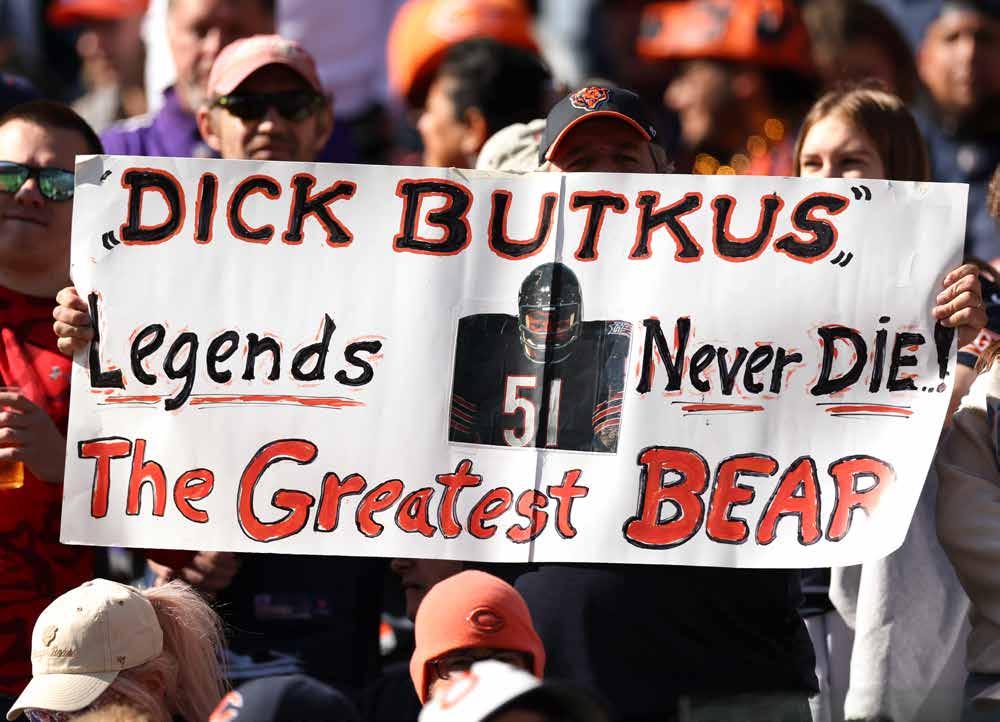
IN MEMORIAM • 139























